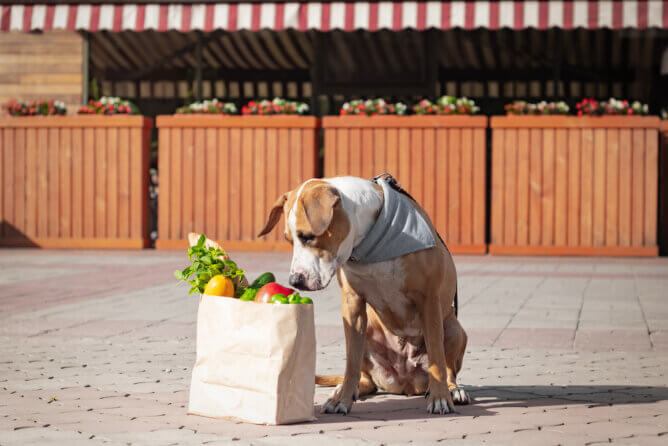
DogFoodAdvisor is reader supported See how
Dog Food Advisor is 100% impartial and is never paid to promote any brand. But if you buy using links on this page, we may earn a referral fee.
If you’re a home cook who already prepares fresh meals for your family every day, adding one more furry member to your meal prep routine might not seem so challenging.
At first glance, the dog food you scoop from a box or tin may seem complex, but making homemade dog food is possible. Many pet parents find joy in knowing exactly what ingredients their dog consumes.
However, it’s important to understand that feeding your dog isn’t as simple as giving them a portion of your dinner. Dogs have specific nutritional needs, and ensuring the correct homemade dog food ratio is essential if you are making the switch.
Is it OK to make homemade dog food?
Absolutely! If you know how. Many pet parents opt for homemade dog food to have complete control over what their dogs eat and find it a bonding experience with their dogs.
However, it’s not a decision you should take lightly as it takes a lot of work and education before dishing out.
If you are thinking of preparing your dog’s food, it’s important to discuss your dog’s long-term health goals with your vet and they will also be able to advise or approve certain homemade recipes.
Is it healthy to cook for your dog?
Homemade dog food that contains the essential nutrients and the correct ingredient ratio is a great option for your dog. However, no scientific evidence supports that homemade dog food is healthier than high-quality commercial food. However, there are benefits and it’s why some pet parents like to put their chef’s hat on for their dog.
What are the benefits of making your own dog food?
Control over your dog’s diet
By preparing your dog’s food at home, you have complete control over what goes into their meals. This especially benefits dogs with allergies, specific health concerns, or picky eating habits. Knowing exactly what ingredients are in their food helps to ensure they are not exposed to anything that might trigger a reaction or exacerbate a condition.
Variety of fresh, whole ingredients
Rather than some processed commercial foods on the market, you can offer a variety of fresh meat and vegetables that you source yourself. This means you won’t have to worry as much about recalls or how food is prepped.
Individually tailored
One of the biggest advantages of homemade dog food is the ability to tailor the diet to your dog’s specific needs. Whether your dog requires weight management, has dietary allergies, or simply prefers certain flavors, you can customize their meals accordingly. This individualized approach can be particularly beneficial for managing health issues and ensuring optimal nutrition.
Are there side-effects to homemade dog food?
The main challenge of making your own dog food is achieving a nutritional balance. A study has shown that 95% of homemade diets are deficient in at least one essential nutrient. 1 Additionally, a study was carried out on home-made recipes and it did not find any recipes available on the internet that were completely nutritious and balanced. 2
Does adding supplements to homemade dog food make it complete and balanced?
“Pet parents often think adding supplements in addition to a dog’s diet will provide the nutrients lacking in the dog food,” says Laura, DFA’s nutritionist.
“However, including supplements does not guarantee dietary balance. In the above study, no diet was found to be complete regardless of supplementation. Providing ingredient variety is also unreliable to balance nutrition in a homemade diet.
“Nutritional deficiencies lead to deficiency diseases — which can take time before outward signs can be noticeable. Same with toxicity.”
Commercial dog food companies employ experts to ensure their products are nutritionally complete and balanced — a task that can be difficult for pet parents to replicate at home.
Risks with making your own dog food
Incomplete Proteins
Dogs need a variety of essential amino acids from their diet. Relying on a single protein source can lead to an incomplete amino acid profile, depriving your dog of critical nutrients.
Calcium and Phosphorus Imbalance
An incorrect balance of calcium and phosphorus can lead to bone and joint issues, particularly in growing puppies or lactating dogs.
Vitamin Deficiencies
Homemade diets often lack adequate levels of vitamins A, D, and B complex, which are essential for overall health.
Microbial Contamination
Improper food handling can lead to contamination, posing a risk to your dog’s health.
Portion Control
Ensuring the correct portion sizes is crucial to avoid underfeeding or overfeeding your dog.
When is homemade dog food not recommended?
Pregnant dogs
Pregnant and lactating dogs have unique dietary requirements that may not be addressed by a recipe found on the internet. A pregnant dog has an extra layer of complexities as they are bringing new life into the world.
Puppies/dogs under one
Feeding your puppy a nutritious diet is one of the most important decisions you will make as a pet parent. Significant bone abnormalities may result if young dogs don’t receive the appropriate amount of calcium and phosphorus.
“The nutrition required for pregnancy, lactation, and growth is greater, and the balance is more difficult to achieve than for adult dogs,” says Laura.
What are the best homemade dog food recipes?
If you are keen to make your own dog food, find verified recipes from reliable sources to guarantee balanced meals.
You can also use kits from places like JustFoodForDogs or The Farmer’s Dog. These kits are a great place to start as experts have created them and you can see exactly what is required for a balanced meal.
But, do these kits meet the nutritional needs?
“Without formulating the meals and supplements, I can’t be 100% sure,” says Laura. “However, if the recipes are carefully followed to match the food and when you add the nutritional supplement that goes with the kits, I am confident that it would provide a balanced meal. Education tools are also available for pet parents who want to learn more about dog nutrition.”
This is a more convenient way to cook for your dog and it involves adding just one supplement to the meal to make a complete recipe.
Dog’s Unique Nutritional Requirements
Dogs require a balanced mix of proteins, fats, carbohydrates, vitamins, and minerals. Each nutrient plays a vital role in their health:
- Proteins: Essential for muscle growth and repair.
- Fats: Provide energy and support cell function.
- Carbohydrates: Supply energy and aid in digestion.
- Vitamins and Minerals: Crucial for immune function, bone health, and overall well-being.
“Ingredient variation isn’t enough to create a nutritionally balanced diet and can easily deliver deficiency or toxic quantities of a nutrient (even when assessed over a week, for instance).
“Many homemade diets, especially raw feeding, use the framework of 80:10:10, or similar (meaning 80% meat, 10% organ, 10% bone) but organs vary massively in the nutrients they supply,” says Laura.
It’s recommended to balance a recipe against the nutritional requirements of AAFCO for the lifestage of your dog.
Making the Transition to a Homemade Dog Food Diet
Some additional tips if making the switch from commercial to homemade food:
Buying Ingredients and Checking Sources
Use high-quality, fresh ingredients from reputable sources to minimize the risk of contamination and ensure nutritional value.
Switch Gradually
Introduce the new diet gradually to allow your dog’s digestive system to adjust.
Monitor Your Dog
Keep an eye on your dog’s health and behavior, and adjust the diet as necessary.
Is Homemade Dog Food Better?
“Often home cooking for dogs is explained as easy and straightforward, with the justification that we cook for ourselves every day,” says Laura. “However, as a population, we struggle to achieve a nutritious diet and diet-related diseases such as obesity and diabetes in humans are a huge concern.
“Diets should be formulated to ensure that they are complete and include all nutrients in the correct balance. Not providing the nutrition we know dogs need to stay healthy, in favor of a meal created at home isn’t the best option for our pets.
“However, homemade diets can absolutely deliver exceptional nutrition when they are balanced well. The formula needs to be approached scientifically to ensure the nutrient balance is maintained.”
Ultimately, homemade dog food isn’t necessarily better than a high-quality commercial diet. Some pet parents might assume homemade is more nutritious, much like a homemade human meal is often better than a takeaway or microwavable option. However, appropriate commercial dog food is carefully formulated to meet dogs’ nutritional needs.
That said, many pet parents enjoy the process of cooking for their pets and appreciate knowing exactly what goes into their bowls. If you choose to make homemade dog food, it’s essential to master the recipe to ensure it’s balanced and nutritious for your furry friend.
Final word
The Dog Food Advisor does not accept money, gifts, samples or other incentives in exchange for special consideration in preparing our reviews.
However, we do receive a referral fee from online retailers (like Chewy or Amazon) and from sellers of perishable pet food when readers click over to their websites from ours. This helps cover the cost of operation of our free blog. Thanks for your support.
For more information, please visit our Disclaimer and Disclosure page.
Sources
Article reviewed by
Laura Ward
Pet Nutritionist
Laura studied BSc (Hons) Animal Science with an accreditation in Nutrition at the University of Nottingham, before working for eight years in the pet food and nutrition industry.




